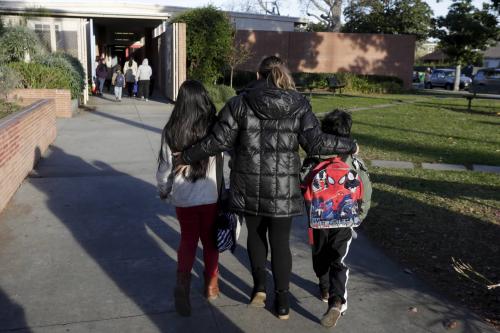This post is a summary of a discussion at an event held on May 9, 2022. Watch the full video here.
Kids start school around age five, and from then on, accounting for holidays, school breaks, and weekends, they only spend one out of every two days actually in a classroom. All told, children spend only about 10% of their childhood in school, according to a new book “The Parent Trap: How to Stop Overloading Parents and Fix Our Inequality Crisis,” by Nate Hilger. That leaves parents responsible for a massive amount of the skill-building children need to do to prepare for life as adults, said Hilger, who was the featured speaker at an event on May 9, 2023 hosted by The Center on Children and Families at Brookings.
Below, read three key takeaways from the event, and click here to watch the full discussion.
What is the parent trap, and what are we really asking of parents?
To develop into successful adults, children need a wide variety of skills – social, emotional, technical, physical, and more. The relatively limited time kids spend in school puts an “overwhelming expectation” on parents to take on the professional-level work of skill-building, said Hilger. “Nine out of ten hours that kids have to practice and learn skills, parents are responsible for orchestrating that, managing that, and making the most out of that time.”
However, this expectation is only one aspect of what Hilger calls “the parent trap.” “It is very hard to talk about the inequality that is associated with this burden that we place on parents,” he said. Even starting a conversation about this inequality is part of the parent trap, says Hilger, because it requires highlighting that, for example, parents without college degrees, extensive social networks, or professional success are at a significant disadvantage in terms of helping their children build skills. “The moment you start to talk about that, people in America start to shut down. They start to get defensive, they start to feel threatened, they feel like you’re accusing some parents of failure or you’re saying that rich parents are better parents than poor parents. It just shuts down the conversation and it makes it impossible to talk about the reality and potential solutions,” Hilger said.
The third element of “the parent trap” that Hilger described is that, because there is no mass advocacy movement for parents in the United States, parents lack an effective political voice. That absence of a collective voice, which could be comparable to the American Association of Retired Persons’ advocacy for Social Security and Medicare, “[Is] a huge missed opportunity for parents to get the kind of support that they need,” said Hilger.
What is the best way to support parents?
Not only are parents’ responsibilities vital to a child’s success, they are wide-ranging, Hilger explained, and many of them are ones we would otherwise ask professionals to handle: nutritionists, college guidance counselors, academic tutors, healthcare managers, and more. “Parents are trying to be CEOs,” said Hilger. Solutions that ask parents, who are already carrying a massive burden, to train themselves to do all of these varied jobs better are not ideal in terms of equity, said Hilger: “The same way that if you want to fly across the country you don’t learn to fly an airplane, you hire a professional pilot … I think parents need professional tutors, they need professional childcare workers, professional college counselors, I think that’s really where we’re going to see a big impact on leveling the economic playing field.”
Hilger’s proposal to fill these needs is a new program he calls “Familycare,” inspired both in name and scale by Medicare, a program that is similar in terms of difficulty, complexity, and cost. Familycare would include family leave for new parents; professional support in the form of high-quality childcare, extracurricular activities, and tutoring; better physical and mental healthcare; and financial and professional support for college and career transitions. Hilger highlighted the equity impacts of such a program: “It would really be providing … upper-middle class childhood opportunities … to a much broader set of kids, and it would be taking some of the financial and logistical stress off of even higher-income parents who do this.” Beyond equity effects, the program would only cost half as much as Medicare, said Hilger, and it would provide more “bang for the buck” by increasing children’s future incomes, simultaneously reducing crime and reliance on welfare and disability insurance.
What is the path forward to policies that support parents and children?
Panelist Sharita Gruberg, Vice President for Economic Justice at the National Partnership for Women and Families, explained just how far the current Congress is from the type of program that Hilger described. The recently passed House debt ceiling plan included cuts to the Head Start program, removal of 1.7 million women and children from food support, and $120 billion cut to Medicaid, the Supplemental Nutrition Assistance Program (SNAP), and Temporary Assistance to Needy Families (TANF) over a decade, explained Gruberg. “Part of the reason for this is they don’t feel like they have to respond to voters with families.” This is in spite of the fact, according to Gruberg, voters overwhelmingly support the kind of programs Hilger proposes.
“We have to make our elected officials fear parents, and it’s possible,” says Gruberg. However, she notes that it will require a major culture shift in what we expect our government to do for families. As moderator Melissa Kearney summarized, “So when [Hilger] is saying parents feel trapped and they’re not getting enough support … they can’t imagine it any other way, this is always the ways it’s been in America.”
But Gruberg thinks the pandemic could help inspire that shift: “The pandemic really shifted people’s ideas of what government can do and what our expectations are, and that policies can work,” she said. Furthermore, where the federal government is falling short, state governments are stepping up: Minnesota’s legislature just passed a comprehensive paid family and medical leave program, for example, as have 11 other states and Washington, D.C., with more states likely to follow. “I wish this was happening across the country, I wish this was happening at the federal level, but the work is taking place, and I think we’re going to start seeing more and more models of what [Hilger]’s putting forward … There are some real opportunities here for states that want to lead.”
The Brookings Institution is financed through the support of a diverse array of foundations, corporations, governments, individuals, as well as an endowment. A list of donors can be found in our annual reports published online here. The findings, interpretations, and conclusions in this report are solely those of its author(s) and are not influenced by any donation.






Commentary
3 big questions answered on “The Parent Trap” and how to support families
May 12, 2023